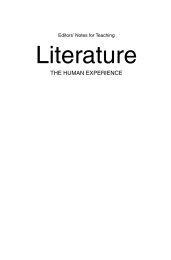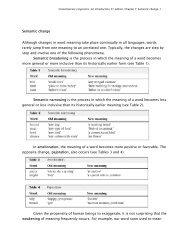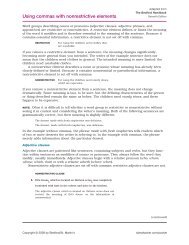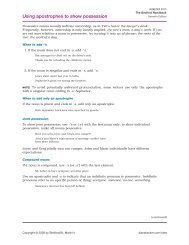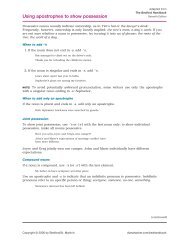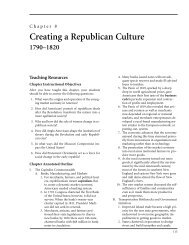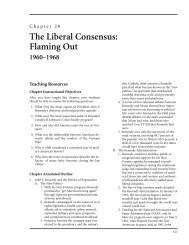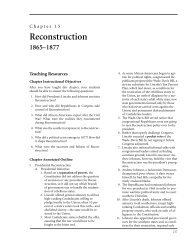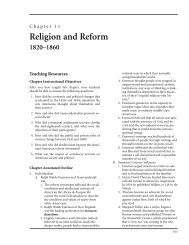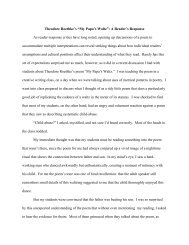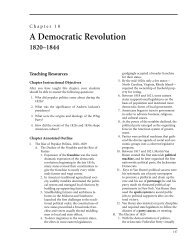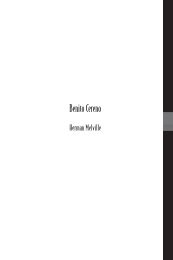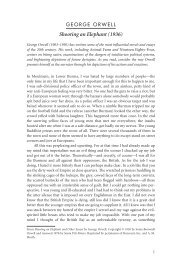GEORGE ORWELL, Politics and the English Language
GEORGE ORWELL, Politics and the English Language
GEORGE ORWELL, Politics and the English Language
Create successful ePaper yourself
Turn your PDF publications into a flip-book with our unique Google optimized e-Paper software.
vitality, as used in art criticism, are strictly meaningless in <strong>the</strong> sense that <strong>the</strong>y not<br />
only do not point to any discoverable object, but are hardly ever expected to do<br />
so by <strong>the</strong> reader. When one critic writes, “The outst<strong>and</strong>ing feature of Mr. X’s<br />
work is its living quality,” while ano<strong>the</strong>r writes, “The immediately striking thing<br />
about Mr. X’s work is its peculiar deadness,” <strong>the</strong> reader accepts this as a simple<br />
difference of opinion. If words like black <strong>and</strong> white were involved, instead of <strong>the</strong><br />
jargon words dead <strong>and</strong> living, he would see at once that language was being used<br />
in an improper way. Many political words are similarly abused. The word Fascism<br />
has now no meaning except in so far as it signifies “something not desirable.”<br />
The words democracy, socialism, freedom, patriotic, realistic, justice, have<br />
each of <strong>the</strong>m several different meanings which cannot be reconciled with one ano<strong>the</strong>r.<br />
In <strong>the</strong> case of a word like democracy, not only is <strong>the</strong>re no agreed definition,<br />
but <strong>the</strong> attempt to make one is resisted from all sides. It is almost universally<br />
felt that when we call a country democratic we are praising it: consequently<br />
<strong>the</strong> defenders of every kind of régime claim that it is a democracy, <strong>and</strong> fear that<br />
<strong>the</strong>y might have to stop using <strong>the</strong> word if it were tied down to any one meaning.<br />
Words of this kind are often used in a consciously dishonest way. That is, <strong>the</strong><br />
person who uses <strong>the</strong>m has his own private definition, but allows his hearer to<br />
think he means something quite different. Statements like Marshal Pétain was a<br />
true patriot, The Soviet Press is <strong>the</strong> freest in <strong>the</strong> world, The Catholic Church is opposed<br />
to persecution, are almost always made with intent to deceive. O<strong>the</strong>r words<br />
used in variable meanings, in most cases more or less dishonestly, are: class, totalitarian,<br />
science, progressive, reactionary, bourgeois, equality.<br />
Now that I have made this catalog of swindles <strong>and</strong> perversions, let me give<br />
ano<strong>the</strong>r example of <strong>the</strong> kind of writing that <strong>the</strong>y lead to. This time it must of its<br />
nature be an imaginary one. I am going to translate a passage of good <strong>English</strong> into<br />
modern <strong>English</strong> of <strong>the</strong> worst sort. Here is a well-known verse from Ecclesiastes:<br />
“I returned <strong>and</strong> saw under <strong>the</strong> sun, that <strong>the</strong> race is not to <strong>the</strong> swift, nor <strong>the</strong><br />
battle to <strong>the</strong> strong, nei<strong>the</strong>r yet bread to <strong>the</strong> wise, nor yet riches to men of<br />
underst<strong>and</strong>ing, nor yet favor to men of skill; but time <strong>and</strong> chance happeneth<br />
to <strong>the</strong>m all.”<br />
Here it is in modern <strong>English</strong>:<br />
<strong>ORWELL</strong> <strong>Politics</strong> <strong>and</strong> <strong>the</strong> <strong>English</strong> <strong>Language</strong> 5<br />
“Objective consideration of contemporary phenomena compels <strong>the</strong> conclusion<br />
that success or failure in competitive activities exhibits no tendency to<br />
be commensurate with innate capacity, but that a considerable element of<br />
<strong>the</strong> unpredictable must invariably be taken into account.”<br />
This is a parody, but not a very gross one. Exhibit (3), above, for instance, contains<br />
several patches of <strong>the</strong> same kind of <strong>English</strong>. It will be seen that I have not<br />
made a full translation. The beginning <strong>and</strong> ending of <strong>the</strong> sentence follow <strong>the</strong> original<br />
meaning fairly closely, but in <strong>the</strong> middle <strong>the</strong> concrete illustrations—race, battle,<br />
bread—dissolve into <strong>the</strong> vague phrase “success or failure in competitive<br />
activities.” This had to be so, because no modern writer of <strong>the</strong> kind I am<br />
discussing—no one capable of using phrases like “objective consideration of con-



